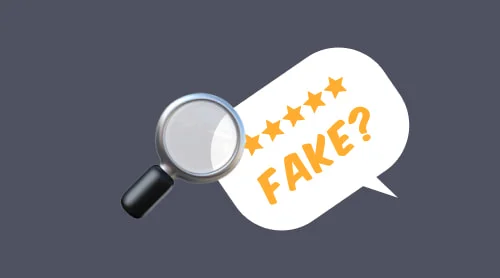How Casinoscripts.shop Deals with Fake Reviews and Competitor Attacks
In the highly competitive world of casino software, maintaining a stellar reputation is crucial. Unfortunately, businesses like buycasinoscript.com often face challenges from unscrupulous competitors who attempt to tarnish their reputation through fake reviews and other malicious tactics. This article delves into identifying these deceitful practices and offers guidance on safeguarding your business.
Recognizing Fake Reviews
1. Unnatural Language Patterns Fake reviews often contain unnatural language, poor grammar, and spelling errors. Phrases may be repetitive, overly generic, or excessively promotional. Authentic reviews, on the other hand, are usually more detailed and balanced, highlighting both positives and negatives.
2. Overly Positive or Negative Reviews Extremely positive reviews that seem too good to be true, or excessively negative ones that lack specific details, can be indicators of fakes. Real reviews generally provide specific feedback based on genuine experiences.
3. Review Timing and Frequency A sudden surge of reviews within a short period, especially if they lean heavily in one direction (all positive or all negative), can signal manipulation. Genuine reviews typically appear at a more consistent rate.
4. Reviewer Profiles Examine the profiles of reviewers. Fake reviewers often have generic usernames, lack profile pictures, and have a history of only posting extreme reviews across multiple unrelated products or services.
5. Lack of Verified Purchase Many platforms indicate whether a reviewer has verified their purchase. Reviews from non-verified buyers should be taken with caution as they may not reflect an actual transaction.
Protecting Against Malicious Competitors
1. Monitor Your Online Presence Regularly monitor review sites, forums, and social media for mentions of your business. Tools like Google Alerts can help you stay informed about what is being said online.
2. Engage with Your Audience Respond to reviews—both positive and negative. Engaging with customers shows that you value their feedback and are committed to improving your service. It also helps mitigate the impact of negative reviews by demonstrating your responsiveness and willingness to resolve issues.
3. Encourage Genuine Reviews Encourage satisfied customers to leave positive reviews. Authentic positive feedback can help outweigh any fake negative reviews. Consider offering incentives for reviews, but ensure they are ethical and comply with platform guidelines.
4. Report Fake Reviews Most review platforms have mechanisms to report suspicious reviews. Provide evidence and request the removal of any reviews you believe to be fake. Persistent issues may require escalating the matter to platform administrators or legal action.
5. Build a Strong Online Reputation Focus on building a robust online presence through high-quality content, SEO strategies, and active social media engagement. A strong, positive reputation can help buffer against the impact of fake reviews.

The Danger of Fake API Development Services
The realm of casino software, including casino scripts and slots API development, is not only competitive but also plagued by scams. Fake API development services can cost businesses up to $20,000, delivering subpar or even non-functional products. Here are key points to consider when evaluating API development services:
1. English Proficiency of the Seller Evaluate the seller’s communication skills. Proficiency in English, or the primary language of your business, is essential for clear and effective communication. Poor language skills can indicate a lack of professionalism and increase the risk of misunderstandings.
2. Existence of a Demo Website Reputable developers should provide a demo website. This allows you to assess the quality of their work and the functionality of their software before committing to a purchase.
3. Vouches and Testimonials Seek out reviews and testimonials from previous clients. Verified feedback can offer insights into the developer’s reliability and the quality of their work.
4. Accepting Escrow Services To safeguard your investment, work with developers who accept escrow services. This ensures that payment is only released when you are satisfied with the delivered product.
5. Knowledge of the Seller Assess the seller’s knowledge of the industry and their specific offerings. An informed seller should be able to answer detailed questions about their products and services, demonstrating their expertise and reliability.
6. Verified Contact Information Ensure the developer provides verifiable contact details, including a physical address and phone number. This adds a layer of security and helps establish their legitimacy.
7. Transparent Pricing Avoid developers with vague or hidden fees. Transparent pricing indicates honesty and reduces the risk of unexpected costs.
8. Detailed Service Descriptions Look for detailed descriptions of the services offered. Clear specifications and feature lists indicate a thorough understanding of the product and its capabilities.
9. Portfolio of Past Work Review the developer’s portfolio to assess the quality and range of their previous projects. A strong portfolio is a good indicator of their experience and expertise.
10. Clear Terms and Conditions Ensure the developer has well-defined terms and conditions. This includes details about project timelines, payment schedules, and post-delivery support.
Conclusion
In the competitive landscape of casino software, maintaining a solid reputation is crucial. By learning to identify fake reviews and protect against malicious competitors, businesses can safeguard their online presence. Additionally, being vigilant about the credentials and reliability of API development services can prevent costly mistakes and ensure the acquisition of high-quality, functional software.
For more information about casino scripts, slots API development, and to explore reliable services, visit buycasinoscript.com.
Sources
- TechRepublic: How to spot fake reviews
- CNET: Spotting fake reviews
- Trustpilot: How to recognize fake reviews
- Google Support: Report fake reviews
- Forbes: The rise of fake reviews

